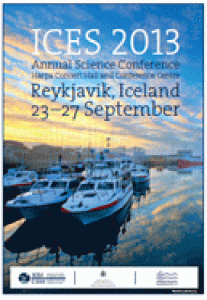Marine
ICES ASC2013, Reykjavik (Iceland) – Marine Spatial Planning Session
December 19, 2013 by Andronikos Kafas No Comments | Category Marine Directorate Science, Marine Renewables
ICES Annual Science Conference 2013 took place in Reykjavik, Iceland from 23rd – 27th of September 2013. There were around 700 participants from 37 countries and more than 430 oral and poster presentations. There were 18 theme sessions covering a range of topics on fisheries management, ecosystem-based management, survey design, spatial statistics, climate change, ocean acidification, oceanography, human behaviour and food web modelling, marine litter, and marine spatial planning.
The latter session, entitled “Marine spatial planning: The multidisciplinary approach”, was very relevant to Marine Renewable Energy Programme’s activities. Here, Andronikos Kafas presented MS’s work on “Mapping fishing activity in Scotland’s inshore waters – analytical approaches applied to data from fishery stakeholders – ScotMap Project” (copy here) as well as “Interactions of commercial fisheries and marine renewable energy developments in Scottish waters” (copy here). Furthermore, Tracy McCollin et al. had a poster presentation the Pentland Firth and Orkney Waters marine spatial plan (copy here).
Other Scottish presentations included
- Christina Kelly and Rachel Shucksmith of NAFC Marine Centre in Shetland sharing the Shetland experience on Marine Spatial Planning (first and second copies here),
- Kate Johnson of Heriot-Watt University, presenting on integrating spatial planning across the land sea divide (copy here)
- James Waggit and Benjamin Williamson of the University of Aberdeen talking about overlaps between deep diving seabirds and tidal stream turbines (copy here) and long-term measurements of the environment around marine renewable energy devices (copy here),
- Helen Wade of the Environmental Research Institute presenting on great skuas interactions with fisheries and marine renewable energy developments (copy here),
- Lauren McWhinnie of Herriot-Watt University who presented on aquaculture planning (copy here),
- Zoe Allcock of the University of Aberdeen, having a poster about top predators interactions with marine renewable energy (copy here)
The session showcased MSP examples in coastal and offshore waters to illustrate the development and application of underpinning science products in this process. The presentations within the session could be categorised in three themes with regard to the key issues addressed:
- Conflicts and synergies: The analysis of interactions (both conflicts and synergies) between different existing and future human activities such as capture fisheries, aquaculture, renewable energy and other activities in the coastal zone and offshore areas using a number of tools ranging from quantitative spatial predictive models to expert knowledge.
- Scenario development and evaluation: The development of spatial management scenarios and risk analysis of their impacts
- Monitoring and evaluation: The evaluation and monitoring of the effectiveness of an implemented place based management including in depth governance analyses
Lessons learnt from the session include:
- Underpinning science to support an ecosystem based marine spatial planning requires both applied research (e.g. conflict and opportunity mapping) and pure research (e.g. as telemetry studies on the behaviour of diving seabirds). Products of the latter require a further process to make applicable in marine planning
- There has been a considerable progress with regard to the mapping and analysis of conflicting human activities, however, gaps have been identified when it comes to the better analysis of synergies between human activities.
- An emerging issue was the question on how integrative MSP can be? It was pleasant to hear that the most prominent example mentioned in the theme’s summary report was the Scottish example of the successful integration of local fishers knowledge into mapping and planning process (ScotMap).
- There has been significant scientific advancement in new products to monitoring and evaluation of place based management (MESMA project).
- Finally, there is a growing need to communicate and translate complex science to planners and stakeholders This in turn requires well trained planners on one side and experienced marine scientist with training in communication on the other hand side.



Leave a comment